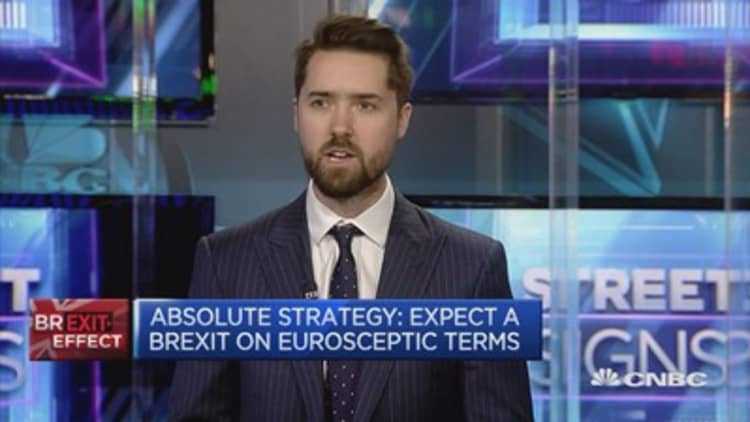The U.K.'s Prime Minister Theresa May is expected to give a speech on the Britain's divorce from the EU next Tuesday.
However, analysts are cautious about the extent to which the prime minister will provide financial markets with clear details on how she sees the future relationship between the U.K. and the EU unfolding.
"One should prepare to be disappointed on the level of detail," Kallum Pickering, senior U.K. economist at Berenberg, told CNBC over the phone.
According to Pickering, Prime Minister May's remarks will be "more of the same" where she will reiterate that she will look for "the best possible deal for the U.K.".
Theresa May promised to set out her approach to Brexit in the new year ahead of triggering the formal process of leaving the EU, article 50, by the end of March.
Richard Mylles, political analyst at Absolute Strategy, told CNBC on Friday that he cautions against expecting too much extra information from Theresa May's speech on Tuesday.
"Theresa May is in a deceptively weak position when it comes to Brexit," Mylles said. Even though Theresa May is more popular than the opposition leader, she needs to please the Eurosceptic and Pro-EU members within her party.
"Fundamentally she has a very small majority," Mylles recalled, adding that Prime Minister May supported the pro-EU campaign in the lead up to the referendum.
Which topics should one look out for?

Nonetheless, analysts and investors will be looking for details on migration, single market access, passporting rights and trade options.
"Migration is the key" issue, Pickering from Berenberg said. Prime Minister May has voiced several times that her priority is regaining control of the U.K's borders, which could indicate that Britain could opt for a "hard Brexit" - meaning that in order to control immigration, it will lose full access to the EU's single market.
"It's clear there's a tradeoff between migration and market access," Pickering added.
European officials have expressed that there is no full access to the single market if there is no freedom of movement. So the more immigration restrictions that Prime Minister May makes, the more restrictions will be imposed on accessing the common market, he also said.
According to Business Europe, within the single market, the free movement of goods generates about 25 percent of the EU's gross domestic product and accounts for 75 percent of intra-EU trade.
Another key issue is the future of the financial services in the U.K. This week, the lobby group TheCityUK, said that it had dropped its demand that the U.K. should keep its passporting rights.
Such rights essentially allow a financial services firm to market products to investors in the European region.
"As a basic scenario we should not expect the U.K. to maintain its passporting rights," Pickering added.
In a scenario of a complete exit from the EU, the U.K. would likely trade with the EU under World Trade Organization rules.
"In our view, we're heading towards WTO rules in the most likely scenario unfortunately," Mylles told CNBC.
Such an option would raise the costs of exporting to the EU for UK firms and it would decrease the access to EU markets for UK companies, a joint research paper from the London School of Economics and the think tank Centre for Economic Performance stated.


